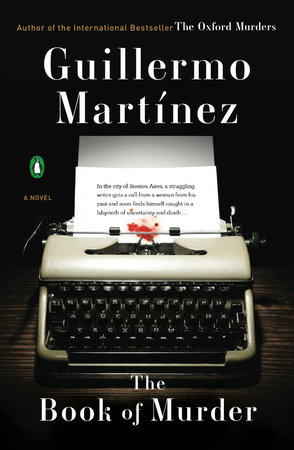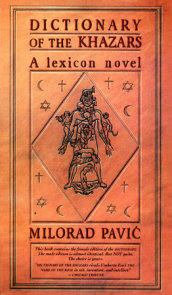READERS GUIDE
Questions and Topics for Discussion
INTRODUCTION
In the world of Argentinean literature, Kloster stands alone. He is a master storyteller whose oeuvre is revered by critics and the public alike. In his hands, mundane detective stories are transformed into psychologically penetrating and intricately wrought works of literature. His talents have won him wealth, celebrity, and the resentment of his fellow writers. So when a woman approaches one of Kloster’s lesser rivals and begs him to save her from the author’s vengeance, the other man must look beyond his jealousy and determine whether the literary titan is as adept with evil in real life as he is on the page.
As Guillermo Martínez’s The Book of Murder opens, the book’s unnamed narrator is a moderately successful Argentinean novelist living quietly in Buenos Aries. He supplements his income with the occasional odd job teaching or writing reviews, but he is far from achieving the kind of success that Kloster enjoys. His only link to the man is Luciana, a young typist whom they both employed many years before, and it is she who brings the narrator her astonishing tale of persecution and woe.
Young, beautiful, and extremely talented at her job, Luciana was invaluable to Kloster. When he was away on retreat, she accepted a temporary position with the narrator. An underlying current of sexuality charged their working relationship—or so he thought—but his attentions were rebuffed and he has not seen her for ten years. When they meet again, she is a changed woman—haggard beyond her years and fearful to the point of paranoia.
In the intervening time, Luciana’s boyfriend, both her parents, and her brother have died in a series of violent accidents. A drowning, a poisoning, and a murder at the hands of a crazed robber—each death occurring under unlikely but just plausible enough circumstances. The authorities think she’s a madwoman, but Luciana is convinced that Kloster masterminded the killings. Not long after her stint with the narrator, Luciana sued Kloster for sexual harassment and unwittingly set in motion a chain of events that resulted in the death of his beloved daughter. Now, she believes that Kloster is pursuing revenge and will only be satisfied once he has also killed her grandmother, sister, and finally Luciana herself.
The narrator is incredulous, but Kloster’s novels are characterized by crimes uncannily similar to those Luciana describes. Even before hearing her story, he’d “concluded simply that behind the desk there must be an obsessive, magnificently sick mind with the power of life and death, a barely restrained megalomaniac” (p. 6). The narrator is intrigued by Luciana’s accusations and—feeling an obligation to the woman with whom he’d once been infatuated—he agrees to help her. As another death is added to the chain, he uncovers evidence that radically alters his understanding of Luciana, Kloster, and ultimately reality itself.
Fans of literary mysteries will delight in this chilling and utterly original new work. A riveting follow-up to The Oxford Murders,The Book of Murder explores the dark confluence between the ruthless machinations of chance and the sinister power of words.
ABOUT GUILLERMO MARTÍNEZ
Guillermo Martínez was born in Argentina in 1962. Since 1985 he has lived in Buenos Aires, where he earned a Ph.D. in mathematics. He is author of the book of short stories Vast Hell (Infierno grande), of the novels Regarding Roderer (Acerca de roderer), The Master’s Wife (La mujer del maestro), The Oxford Murders (Crímenes imperceptibles), The Book of Murder (La muerte lenta de Luciana B.) and of the books of essays Borges and Mathematics (Borges y la matemática) and The Immortality Formula (La fórmula de la inmortalidad). The Oxford Murders was awarded the Argentinean Planeta Prize and has been an international success. It has been translated into more than thirty languages and made into a film by Spanish director Alex de la Iglesia starring Elijah Wood and John Hurt. The Book of Murder has been hailed by Spanish critics as one of the ten best books of the year.
A CONVERSATION WITH GUILLERMO MARTÍNEZ
You have a Ph.D. in mathematical logic. What made you decide to become a writer?
I was always a writer. Math came much later in my life. My father was a writer (although he never bothered to publish), my mother was a literature professor, and books were all over my house as a part of the landscape of my childhood. I finished my first book of short stories before I was nineteen. In fact, math was the strange accident of my life. During my life as a mathematician I never gave up writing and I wrote my seven books in a kind of parallel life. I quit the university and my mathematics career three years ago and now I am totally devoted to writing novels.
Are there similarities between mathematics and writing fiction?
There are some. I wrote a whole book about the influence of mathematical ideas in some of Borges’s short fiction. There are also more obvious connections in Lewis Carroll, Robert Musil, Raymond Queneau, Philip K. Dick. There is also an analogy in the way that mathematicians discover regularities, patterns, and figures and codify them in a written sequential text called a proof and the way that writers find plots, voices, and characters and codify them in a written sequential text called a novel or short story. Both mathematics and literature have aesthetic appeal for me, but I feel more at home with writing. I think I have more interesting literary ideas than the few really original insights I had in math.
Who is your favorite mathematician and why?
Kurt Gödel because of the discovery of the essential incompleteness of arithmetic and the limits of proof methods based in axioms. He is the perfect example of how close math can be to philosophy.
Who are your literary influences? The novel’s narrator mentions Max Beerbohm, Henry James, Italo Calvino, and Oliver Sachs among others.
I admire Henry James, Thomas Mann, Jorge Luis Borges, Julio Cortázar, Witold Gombrowicz, Truman Capote, E. L. Doctorow, Patricia Highsmith, and Dino Buzzati among others.
There are echoes of Hitchcock’s Vertigo. Was this an influence?
I was not conscious of this as an influence, but I have seen most of Hitchcock’s films and I do admire his way of handling suspense. I have probably absorbed one or two lessons from him without even noticing. I am aware of his influence in one of the scenes in my previous novel The Oxford Murders: the scene at the concert.
What are the primary differences between Argentinean and American mystery writing and what do you like and dislike about each?
I would say that American writers are more careful in respecting “reality” and they are more comfortable within the limits of the genre. They tend to research small details and they try to be accurate and to show off how much they know about technical subtleties like forensic practices and professional jargon. Argentinean writers tend to dismiss this kind of realism and go for a stylized version of reality. The result is more imaginative, daring fiction even if it cannot be completely supported by documented facts. Also, in general, Argentinean writers are not satisfied if they don’t try some kind of rupture of the genre along the way.
Kloster seems to have elements of both Thomas Pynchon and Stephen King. Is there a “real” Kloster?
There is no “real” Kloster, although I have imagined some kind of male variant of Patricia Highsmith for one or two of his features.
Do you believe that all authors have a literary giant whose intimidating presence looms over them? Do you—like Enoch Soames—write for immortality or is there something else that drives you?
The giant can be different at different steps of your career. Borges, for instance, is still an intimidating shadow for many writers in my country and they have developed all sorts of strategies and theories to overcome him. I don’t write for immortality, but I do try to write according to some kind of inner truth of the story that emerges along the way while you are working. For me, this abstract form, this elusive figure to chase, is something of the same order of an ideal mathematical thread. It guides me and many times it rules me. So even when I don’t have any expectations about the longevity of my work, I do have hopes about the permanence of these inner harmonies for those in the future that might open my book.
In both The Oxford Murders and The Book of Murder the narrator is neither a policeman nor a detective but rather an innocent who becomes embroiled in the events. What do you prefer about using an amateur investigator?
It is a way of avoiding the stereotypes of crime writing. It provides a different insight, some freshness to a literary field full of clichés and commonplaces.
DISCUSSION QUESTIONS






















